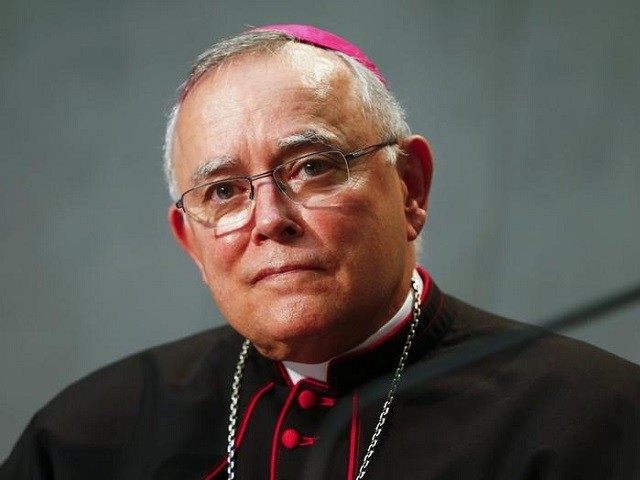Philadelphia Archbishop Charles Chaput says that attempts to equate the purposeful ending of human life through abortion with other social justice issues – such as poverty, racism, and unemployment – are on morally shaky ground.
“The deliberate killing of innocent life is a uniquely wicked act,” Chaput wrote. “No amount of contextualizing or deflecting our attention to other issues can obscure that.”
The archbishop went on to explain that while nearly all Catholic dioceses in the United States – including his own – spend far more time and talent on providing social services to the poor rather than on opposing abortion, the fact remains that “children need to survive the womb before they can have needs like food, shelter, immigration counseling and good health care.”
Chaput reflects, in fact, what many Catholics complain about: their parish priests are much more likely to discuss social justice issues from the pulpit than the evils of abortion.
“Humanity’s priority right – the one that undergirds all other rights – is the right to life,” Chaput asserts, explaining that the Catholic bishops wrote that being “right” in matters of social justice “can never excuse a wrong choice regarding direct attacks on innocent human life.”
“All direct attacks on innocent human life, such as abortion and euthanasia, strike at the house’s foundation,” he continued. “These directly and immediately violate the human person’s most fundamental right — the right to life. Neglect of these issues is the equivalent of building our house on sand. Such attacks cannot help but lull the social conscience in ways ultimately destructive of other human rights.”
Chaput’s statement comes on the heels of an op-ed in the Chicago Tribune by Chicago Archbishop Blase Cupich, who used the horrific and gruesome Planned Parenthood undercover investigative videos as a means to draw attention to what he believes are equally appalling social justice issues.
As Breitbart News reported Friday, Cupich wrote that the overwhelming reactions of horror at the videos depicting Planned Parenthood top medical personnel discussing how to abort a baby so as to save its body parts for potential sale to biomedical companies, was a sign of hope that perhaps people are finally becoming aware of the humanity of an unborn child.
Nevertheless, Cupich went on to make the argument for moral equivalency of the brutal killing of unborn babies – and the potential profit from it – with many problematic areas of society. He writes:
We should be no less appalled by the indifference toward the thousands of people who die daily for lack of decent medical care; who are denied rights by a broken immigration system and by racism; who suffer in hunger, joblessness and want; who pay the price of violence in gun-saturated neighborhoods; or who are executed by the state in the name of justice.
In contrast, Archbishop Chaput writes, “A case is sometimes made that abortion is mainly a cultural and moral issue, and politics is a poor solution to the problem.”
“The curious thing,” he continues, “is that some of the same voices that argue against political action on the abortion issue seem quite comfortable urging vigorous political engagement on issues like health care, homelessness and the environment.”
Observing that “politics is the application of moral conviction to public discourse and the process of lawmaking,” Chaput asserts that “law not only reflects culture; it shapes and reshapes it,” and argues that, because of this process, Christians have no choice but to be politically engaged.
The archbishop calls to mind:
Two years ago Kermit Gosnell was stripped of his medical license and convicted of murdering three infants born alive from abortion procedures. He operated a Philadelphia abortion center that more closely resembled a butcher shop than a medical clinic. His clinic environment was uglier than the pleasant restaurants and offices captured on recent Center for Medical Progress (CMP) undercover videos. Those videos show a face of Planned Parenthood – senior staffers chatting blithely about the dismemberment and sale of fetal body parts – that can only be called repugnant. But it’s not surprising: If aborted children are simply lumps of potentially useful (and profitable) tissue, what’s the problem?
Archbishop Cupich, a regular contributor to the Jesuit magazine America, is not new to the “contextualization” of abortion.
In late October of 2008, just prior to the presidential election in which Barack Obama and John McCain were the candidates, the archbishop wrote an article about racism, during which he suggested that casting a vote based on race is morally equivalent to voting for a pro-abortion candidate:
Voting for a candidate solely because of that candidate’s support for abortion or against him or her solely on the basis of his or her race is to promote an intrinsic evil. To do so consciously is indeed sinful. That is behavior incompatible with being a Christian. To allow racism to reign in our hearts and to determine our choice in this solemn moment for our nation is to cooperate with one of the great evils that has afflicted our society.
As Breitbart News previously observed, Cardinal Joseph Ratzinger – who would eventually become Pope Benedict XVI – wrote in 2004 regarding a Catholic’s worthiness to receive communion, “The Church teaches that abortion or euthanasia is a grave sin.”
“Not all moral issues have the same moral weight as abortion and euthanasia,” he continued. “For example, if a Catholic were to be at odds with the Holy Father on the application of capital punishment or on the decision to wage war, he would not for that reason be considered unworthy to present himself to receive Holy Communion.”
“There may be a legitimate diversity of opinion even among Catholics about waging war and applying the death penalty, but not however with regard to abortion and euthanasia,” the future Pope said.

COMMENTS
Please let us know if you're having issues with commenting.